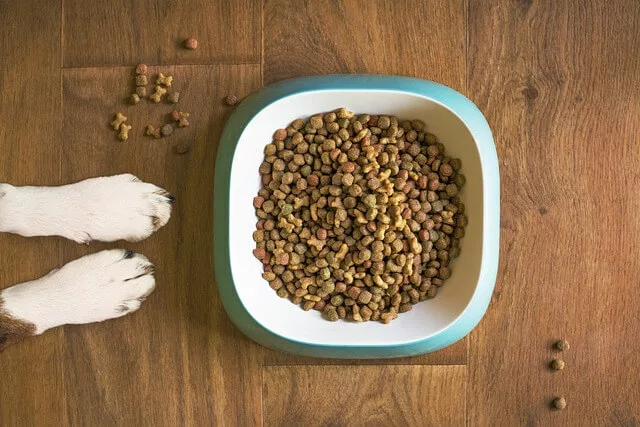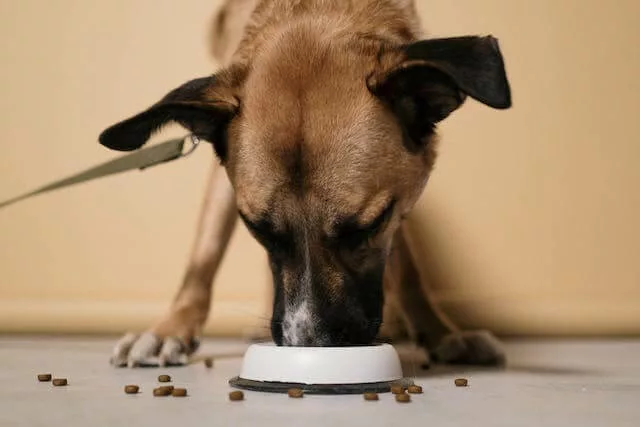Hello to all caring pet parents out there! Like many of you, I’ve found myself puzzled and concerned in front of a pup experiencing the discomfort of a sensitive stomach. Managing our furry friends’ digestive woes often feels like a winding journey through endless dietary choices, trying to determine what eases their little tummies. Together, let’s embark on a journey to unravel the practical, vet-approved dietary training methods that cater precisely to our dogs with sensitive stomachs. Let’s turn mealtimes into moments of joy rather than instances of distress for our pups, ensuring they relish every bite without a hint of discomfort. Welcome to this enlightening and nurturing journey with our four-legged companions!
Discovering Digestive Dilemmas: Identifying Signs of a Sensitive Stomach in Dogs

Navigating the world of pet parenting comes with a plethora of joyful moments and a few hurdles. One such hiccup is unraveling the mystery behind our pups’ sensitive stomachs. From observing subtle symptoms to addressing both their physical and emotional wellbeing, this journey into their digestive health can be a learning curve for us dedicated dog parents.
From Upset Stomach to Vomiting
Spotting the signs was the first step for my Labrador. Those big brown eyes could hide a lot, but his decreased appetite and intermittent vomiting were telltale signs that something was amiss in his tummy. My dog’s once playful demeanor became littered with periods of lethargy, prompting an in-depth dive into scrutinizing every detail of his diet and symptoms. Were specific dog foods triggering these episodes? Does a particular snack precede an upset stomach? As pet parents, keeping a keen eye on such patterns is vital in differentiating between occasional digestive mishaps and chronic digestive issues.
The Emotional and Physical Impact of Digestive Issues on Your Pup
You might have noticed, just like I did with my dog, how his tummy troubles didn’t just end with physical symptoms. The once playful and adventurous pup suddenly showed a hesitance towards play and displayed moments of irritability. Understanding and addressing these emotional changes were as pivotal as managing the visible symptoms. His digestive issues, I realized, were not just a physical battle but an emotional one too, necessitating a holistic approach to his wellbeing.
Importance of a Veterinarian’s Diagnosis in Cases of Persistent Tummy Troubles
Navigating through my dog’s digestive issues emphasized the irreplaceable role of a veterinarian’s expertise. A vet doesn’t just validate our concerns but digs deeper into the root cause using a variety of diagnostic tools, ensuring that the path forward is not just a shot in the dark but a well-informed strategy to manage sensitive stomach issues. Through comprehensive check-ups, dietary reviews, and various tests, the veterinarian provided a structured, scientifically-backed roadmap, ensuring that the dietary adjustments and any necessary medical treatments were precisely what my dog needed.
Sharing Experiences of Managing Digestive Sensitivity in Dogs
The journey didn’t just stop at managing my dog’s digestive health; sharing experiences with and learning from a community of pet parents became invaluable. Stories from others who were on similar journeys offered insights that were both practical and emotionally supportive. Navigating through forums, social media groups, and community blogs not only broadened my understanding but also provided comfort in knowing that this path was well-trodden. My dog’s story, too, became a beacon for others, shedding light on the myriad aspects of managing digestive sensitivity in dogs while promoting a sense of shared understanding and empathy within the community.
Through attentive observation, comprehensive care, specialized advice from veterinarians, and a supportive community, navigating through the hurdles of digestive dilemmas became a journey of learning, understanding, and empathy. The path to managing my dog’s sensitive stomach was dotted with challenges, but each step was a stride towards ensuring his utmost wellbeing, underlining the unwavering bond and unspoken promise between pet parents and their furry friends. Together, let’s continue to explore, understand, and share, ensuring our canine companions not only live but thrive amidst challenges with our steadfast love and informed care by their side.
The Right Dog Food for Sensitive Stomachs

Managing a dog with a sensitive stomach can feel like navigating through a complex puzzle, where every piece must fit perfectly to ensure our beloved pets find comfort in their meals. We’ve all witnessed those puppy eyes looking up at us, perhaps after a particularly troubling bout of stomach upset, and it sends us on a quest: to find the right food for dogs with sensitive stomachs.
Unpacking Dog Food Labels: What to Look For and What to Avoid
Browsing through aisles of pet food, you’ve probably wondered: which one is the best food for dogs, especially for those with a delicate digestive system? Unpacking dog food labels, my friends, provides valuable clues in making informed choices. Spotting high-quality ingredients and avoiding potential allergens is key. Names of actual meat sources, absence of artificial preservatives, and recognizable ingredients are your allies in safeguarding your dog’s sensitive stomach. It’s not just about feeding them; it’s about ensuring each bite supports their health, without upsetting that delicate digestive balance.
The Debate: Kibble vs. Cooked Food for Sensitive Tummys
Ah, the classic conundrum! Kibble or cooked food? This debate has filled many dog owners with pondering pauses at the food aisle. Kibble, with its convenience, and often fortified with essential vitamins and minerals, can be a practical choice. However, the realm of cooked food opens up a world where every ingredient is known and chosen by you, safeguarding your dog’s sensitive digestion from hidden triggers. While kibble might be a ready-to-go option, cooked food can offer a personalized menu for your pooch. Both have their merits, and your choice may hinge on what your dog could find more digestible and palatable.
Navigating through Best Dog Food Choices with a Veterinarian’s Guidance
Bringing a veterinarian into this journey could be your compass in this nutritional navigation. A vet not only identifies potential dietary triggers but also crafts a balanced, nutritious meal plan for your pup, ensuring that the food might not only be delicious but also gentle on their stomach. Your vet might navigate you towards specific brands, prescription diets, or guide you in tailoring a homemade diet that won’t stir up any stomach problems, ensuring a happy, wagging tail at mealtime!
Transformative Tales of Dietary Changes for Sensitive Stomachs
Embark on a heartwarming journey with us as we explore real stories from the doggy world in our segment, Transformative Tales of Dietary Changes for Sensitive Stomachs! Today, we’re sharing the inspiring stories of two dog parents, Jennifer and Tom, and the life-altering dietary transitions they navigated for their beloved pups, Bella and Max.
The Journey from Constant Worry to Contented Comfort with Bella
Interviewer: “Good day, folks! Today we have the delightful pleasure of chatting with Jennifer, a dedicated dog mom who navigated through the tumultuous waves of dietary challenges with her adorable Beagle, Bella. Jennifer, could you share with us the first signs that made you realize Bella had a sensitive stomach?”
Jennifer: “Absolutely! It all began when Bella, my once vivacious and playful pup, began showcasing bouts of lethargy and an unmistakable discomfort post meals. It was heartbreaking to watch her swap her lively fetch sessions for curled up naps in her bed. Her stomach would make these odd gurgling noises, and oh, the endless trips outside due to diarrhea. That was our wake-up call.”
Interviewer: “What an ordeal for both of you! How did you and your vet decide to tackle Bella’s sensitive stomach?”
Jennifer: “The veterinarian was pivotal in our journey! Through numerous tests and discussions about Bella’s symptoms, we realized that an elimination diet was our first step towards discovering what was triggering her stomach upset. It was a meticulous, yet necessary, process of introducing single protein and carbohydrate sources to discern what was amicable with her digestion and what wasn’t.”
Interviewer: “Certainly sounds like an investigative mission. Were there any pivotal moments that transformed Bella’s dietary journey?”
Jennifer: “Oh, yes! Introducing probiotics was our game-changer. The vet recommended a particular brand, and within weeks, Bella’s digestive system showcased remarkable improvement. Her stools normalized, the gurgling ceased, and my energetic Beagle was back, tail wagging and eyes gleaming with mischief and joy once again!”
Charting Through the Sea of Food Allergies with Max
Interviewer: “Here we are with our second tale, shared by the ever-optimistic Tom, whose Golden Retriever, Max, underwent a phenomenal transformation following some serious dietary adjustments. Tom, could you delve into the initial challenges Max faced?”
Tom: “Gladly! Max always had a robust appetite. But, when his voracious eating was followed by vomiting and visible fatigue, worry seeped in. It was a perplexing phase because he would eat, then look so bloated and would often have episodes of flatulence, which was unlike him. His glossy coat started to dull and shed more than usual, signaling that something was amiss internally.”
Interviewer: “It must have been quite an emotional rollercoaster, seeing Max in such a state. How did you proceed?”
Tom: “Indeed, it was. Our vet suggested we explore the avenue of food allergies, considering his symptoms. A hydrolyzed protein diet was introduced, and we kept a vigilant eye on any alterations in his condition. It was tough initially, seeing him not as thrilled with his meals, but we persisted.”
Interviewer: “Persistence often leads to breakthroughs! Was there a breakthrough moment in Max’s story?”
Tom: “Absolutely! After weeks on the new diet, not only did Max’s digestive issues dissipate, but his coat began radiating a splendid shine, signaling his internal and external health were synchronizing beautifully. The revelation that food, something so fundamental, could wreak such havoc was eye-opening. Now, Max relishes his specialized diet, and his tail wags are back, full of life and love!”
Discovering Vet-Approved Dietary Training: Adapting Your Dog to a New Digestible Diet

Engaging with Professionals: When to Seek a Vet or a Canine Nutritionist’s Advice
Embracing the role of a responsible dog parent, I quickly learned that when my pooch, showed signs of an upset stomach, prompt guidance was imperative. Seeing my dog discomfort, characterized by diarrhea and lethargy, made me rush to seek professional help. Conversations with veterinarians and canine nutritionists brought enlightenment in understanding the nuances of dog food diets, especially when dealing with food sensitivities. These professionals helped decipher my dog’s needs, guiding through the myriad of options and ensuring that his new food was not just palate-pleasing but also gentle on his digestive system.
Charting Progress: Keeping a Food and Symptom Diary for Your Dog
When managing a dog with a sensitive stomach, our vigilance is our best tool. After observing my dog’s sporadic episodes of digestive upset, I turned to maintaining a meticulous food and symptom diary, which surprisingly, became my best ally in managing his condition. Recording every meal, treat, and subsequent reaction helped in pinpointing exact triggers, which sometimes can be as innocent-looking as a piece of table scrap or a new food introduction. This not only assisted in tailoring his diet but also provided an accurate record for the vet, ensuring that my dog got the best advice based on real data from his day-to-day.
Navigating through Best Dog Food Choices with a Veterinarian’s Guidance
When it comes to choosing the best type of food for a sensitive canine companion, there’s an overwhelming sea of choices: kibble, wet food, raw food, homemade diets, and many more. My dog’s vet was a lighthouse, guiding us through this ocean of options, assisting in identifying potential dietary nuisances causing his stomach problems, and establishing a diet that was both nutritious and gentle on his digestion. It was a relief to remove the guesswork and have a structured plan, knowing that his meals were vet-approved and crafted with his specific needs in mind.
Practical Tips for a Happy Tummy: Ensuring Ongoing Gastrointestinal (GI) Health

Being a paw parent brings immense joy and tail-wagging happiness to our lives. But, what if every bite your four-legged friend takes is a roll of the dice on their comfort? When it comes to dogs with sensitive stomachs, ensuring a joyful and pain-free eating experience becomes a top priority. Here, we delve into some wholesome tips and experiences to keep that furry tummy happy and healthy!
Practical Tips on Feeding and Monitoring Dogs with Sensitive Stomachs
As an attentive dog parent, ensuring my furry companion eats well while keeping his sensitive stomach in check has become a delicate art. The key? Consistency in feeding schedules and keen observation. Every dog, especially those with sensitive stomachs, benefits from a routine. Establishing a regular feeding time assists in maintaining a stable digestive system. Meanwhile, keeping an eye on their post-meal behavior and stool consistency gives early warnings should an issue arise, allowing us to pivot dietary choices effectively and efficiently.
The Role of Probiotics and Easily Digestible Foods in Managing GI Sensitivity
Probiotics are often hailed as the “friendly bacteria”, and for our dogs, they indeed are! Introducing probiotics into my dog’s diet has been a game-changer, contributing to a balanced gut flora and thereby, aiding smoother digestion. Pairing this with easily digestible foods, like a simple chicken and rice concoction, ensures that the sensitivity tract isn’t overburdened, reducing the likelihood of stomach upset and making meals a delightful experience rather than a dreaded ordeal.
Recognizing Relapse: Identifying and Responding to Return of Tummy Issues
Despite our best efforts, relapses do happen. Observing my dog closely post meals, especially noting instances of diarrhea or flatulence, has sometimes been my first clue that not all is well in his little tummy. Immediate action, like reverting to a safe diet or initiating an elimination diet, becomes crucial in minimizing discomfort. Simultaneously, swift consultation with the vet ensures we root out and address the cause, preventing prolonged discomfort.
Celebrating Triumphs Over Persistent GI Troubles with the Right Diet
Oh, the happiness of finding ‘the’ diet that eliminates those troublesome GI issues! Witnessing our furry pals relish their meals, sans the subsequent pain or discomfort, is genuinely a triumphant moment worth celebrating. My dog’s journey from frequent upset tummies to gleefully enjoying his meals, while maintaining optimal digestive health, has been filled with trials. But finding a diet that not only satisfies his taste buds but also agrees with his stomach? Priceless!
In every gobbled-up bowl of food and every energetic tail wag after meals, we find the successful tales of navigating through GI troubles. The joy in those bright eyes and vivacious spirit post-meal is our trophy in the thorough journey of trials, errors, vet visits, and finally, landing on a diet that ensures every bite is a step towards health and happiness. So, here’s to our paw pals, to every meal enjoyed fully, and every triumph over tummy troubles!






